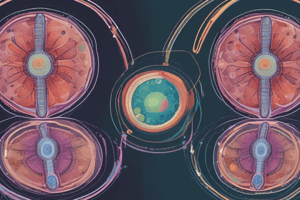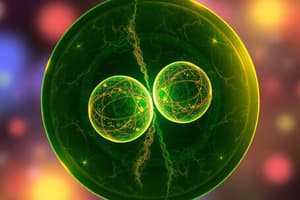Podcast
Questions and Answers
Which stage of meiosis involves the maximum condensation of chromosomes?
Which stage of meiosis involves the maximum condensation of chromosomes?
- Metaphase I (correct)
- Prophase I
- Telophase I
- Anaphase II
Chiasmata are the points where homologous chromosomes are drawn apart during diplotene.
Chiasmata are the points where homologous chromosomes are drawn apart during diplotene.
False (B)
How many products are formed from one parent cell after meiosis?
How many products are formed from one parent cell after meiosis?
Four
The process of pairing homologous chromosomes begins in __________.
The process of pairing homologous chromosomes begins in __________.
Match the following stages of meiosis with their characteristics:
Match the following stages of meiosis with their characteristics:
What is the main outcome of meiosis?
What is the main outcome of meiosis?
Metaphase I is referred to as the reductional division.
Metaphase I is referred to as the reductional division.
During __________, the nuclear membrane and nucleolus disappear.
During __________, the nuclear membrane and nucleolus disappear.
What happens to the nuclear envelope during prophase?
What happens to the nuclear envelope during prophase?
Maximum condensation of chromatin occurs during metaphase.
Maximum condensation of chromatin occurs during metaphase.
What enzyme is thought to play a role in chromosome condensation during metaphase?
What enzyme is thought to play a role in chromosome condensation during metaphase?
Each chromosome consists of two _______ during metaphase.
Each chromosome consists of two _______ during metaphase.
What is the function of the kinetochore?
What is the function of the kinetochore?
The centromere divides longitudinally during telophase.
The centromere divides longitudinally during telophase.
Match the following components with their respective functions:
Match the following components with their respective functions:
Misalignment of chromosomes in the equatorial region may _______ cells at metaphase.
Misalignment of chromosomes in the equatorial region may _______ cells at metaphase.
What type of gene is responsible for the segregation distorter (SD) mutation in Drosophila males?
What type of gene is responsible for the segregation distorter (SD) mutation in Drosophila males?
Drosophila males experience crossing over in meiosis.
Drosophila males experience crossing over in meiosis.
What effect does the recovery disrupter (RD) mutation have on male Drosophila?
What effect does the recovery disrupter (RD) mutation have on male Drosophila?
The microtubules in the spindle apparatus are assembled from __________ proteins.
The microtubules in the spindle apparatus are assembled from __________ proteins.
Match the following mutations with their effects:
Match the following mutations with their effects:
Which stage of meiosis is primarily affected by most meiotic mutants in Drosophila?
Which stage of meiosis is primarily affected by most meiotic mutants in Drosophila?
Spindle fibers are composed of microtubules that have a diameter of 20 nm.
Spindle fibers are composed of microtubules that have a diameter of 20 nm.
What are the smaller circles observed in the cross section of a microtubule called?
What are the smaller circles observed in the cross section of a microtubule called?
Which protein kinase is responsible for phosphorylating tyrosine-15 on Cdc2?
Which protein kinase is responsible for phosphorylating tyrosine-15 on Cdc2?
Cdc2 kinase activity is activated through the phosphorylation of tyrosine-15.
Cdc2 kinase activity is activated through the phosphorylation of tyrosine-15.
What process degrades cyclin B and inactivates Cdc2?
What process degrades cyclin B and inactivates Cdc2?
The transition from G1 to S phase is regulated by Cdk2 and Cdk4 in association with cyclins _____ and _____.
The transition from G1 to S phase is regulated by Cdk2 and Cdk4 in association with cyclins _____ and _____.
Match the following Cdk proteins with their associated phases:
Match the following Cdk proteins with their associated phases:
Which of the following describes the role of Cdc25 in the cell cycle?
Which of the following describes the role of Cdc25 in the cell cycle?
Cdks are only controlled by cyclin associations and have no other regulatory mechanisms.
Cdks are only controlled by cyclin associations and have no other regulatory mechanisms.
What is the original member of the Cdk family known as?
What is the original member of the Cdk family known as?
What is the role of D-type cyclins in cell cycle progression?
What is the role of D-type cyclins in cell cycle progression?
Growth factors must be present throughout G1 for cells to progress through the restriction point.
Growth factors must be present throughout G1 for cells to progress through the restriction point.
What happens to cells when growth factors are removed prior to G1?
What happens to cells when growth factors are removed prior to G1?
Defects in cyclin D regulation contribute to the loss of growth regulation characteristic of _____.
Defects in cyclin D regulation contribute to the loss of growth regulation characteristic of _____.
Match the following cyclin-related components with their functions:
Match the following cyclin-related components with their functions:
Which of the following is a key substrate protein of Cdk4, 6/cyclin D complexes?
Which of the following is a key substrate protein of Cdk4, 6/cyclin D complexes?
Mutations leading to continuous expression of cyclin D1 are unrelated to human cancers.
Mutations leading to continuous expression of cyclin D1 are unrelated to human cancers.
What are the consequences of phosphorylating the Cdc threonine residue at position 160?
What are the consequences of phosphorylating the Cdc threonine residue at position 160?
What percentage of cells showed the unpaired chromosome passing to one pole with the larger homologue in grasshoppers?
What percentage of cells showed the unpaired chromosome passing to one pole with the larger homologue in grasshoppers?
Boveri's work on sea urchins contradicted Blakeslee's findings with Datura.
Boveri's work on sea urchins contradicted Blakeslee's findings with Datura.
What is the normal diploid chromosome number in Datura?
What is the normal diploid chromosome number in Datura?
T.H. Morgan demonstrated that the gene for white eye color in Drosophila was linked to the ______.
T.H. Morgan demonstrated that the gene for white eye color in Drosophila was linked to the ______.
Match the scientists with their contributions:
Match the scientists with their contributions:
Which of the following is NOT one of the characteristic features of chromosomes as discovered by Boveri and Sutton?
Which of the following is NOT one of the characteristic features of chromosomes as discovered by Boveri and Sutton?
Each of the 12 plant types in Datura had morphologically identical fruit capsules.
Each of the 12 plant types in Datura had morphologically identical fruit capsules.
What phenomenon describes the inability of Mendel's law of independent assortment to apply to some genes?
What phenomenon describes the inability of Mendel's law of independent assortment to apply to some genes?
Flashcards
What is metaphase?
What is metaphase?
The stage of mitosis where chromosomes are maximally condensed and aligned at the center of the cell.
What is a centromere?
What is a centromere?
A region on a chromosome where sister chromatids are held together. It's the site where microtubules attach during cell division.
What is a kinetochore?
What is a kinetochore?
A protein structure on the outer surface of the centromere that serves as the attachment point for microtubules during mitosis.
What are spindle fibers?
What are spindle fibers?
Signup and view all the flashcards
What are chromosomal microtubules?
What are chromosomal microtubules?
Signup and view all the flashcards
What is chromosome condensation?
What is chromosome condensation?
Signup and view all the flashcards
What is topoisomerase II?
What is topoisomerase II?
Signup and view all the flashcards
What is a mitotic spindle apparatus?
What is a mitotic spindle apparatus?
Signup and view all the flashcards
Middle lamella
Middle lamella
Signup and view all the flashcards
Primary wall
Primary wall
Signup and view all the flashcards
Meiosis
Meiosis
Signup and view all the flashcards
Prophase I
Prophase I
Signup and view all the flashcards
Zygotene
Zygotene
Signup and view all the flashcards
Pachytene
Pachytene
Signup and view all the flashcards
Diplotene
Diplotene
Signup and view all the flashcards
Diakinesis
Diakinesis
Signup and view all the flashcards
Nondisjunction in Drosophila Males
Nondisjunction in Drosophila Males
Signup and view all the flashcards
Segregation Distorter (SD) Mutant
Segregation Distorter (SD) Mutant
Signup and view all the flashcards
Recovery Disrupter (RD) Mutant
Recovery Disrupter (RD) Mutant
Signup and view all the flashcards
Spindle Apparatus
Spindle Apparatus
Signup and view all the flashcards
Microtubules
Microtubules
Signup and view all the flashcards
α and β Tubulin
α and β Tubulin
Signup and view all the flashcards
Protofilaments
Protofilaments
Signup and view all the flashcards
Tubulin Dimer
Tubulin Dimer
Signup and view all the flashcards
What is a kinase?
What is a kinase?
Signup and view all the flashcards
What is a phosphatase?
What is a phosphatase?
Signup and view all the flashcards
What is Cdc2?
What is Cdc2?
Signup and view all the flashcards
What is cyclin B?
What is cyclin B?
Signup and view all the flashcards
What is the S phase?
What is the S phase?
Signup and view all the flashcards
What is the G2 phase?
What is the G2 phase?
Signup and view all the flashcards
What is the M phase?
What is the M phase?
Signup and view all the flashcards
What are Cyclin-dependent kinases (Cdks)?
What are Cyclin-dependent kinases (Cdks)?
Signup and view all the flashcards
Restriction Point
Restriction Point
Signup and view all the flashcards
Cdk Inhibitors (CKIs)
Cdk Inhibitors (CKIs)
Signup and view all the flashcards
D-type Cyclins
D-type Cyclins
Signup and view all the flashcards
Rb Protein
Rb Protein
Signup and view all the flashcards
Cyclin-Dependent Kinases (CDKs)
Cyclin-Dependent Kinases (CDKs)
Signup and view all the flashcards
Cyclins
Cyclins
Signup and view all the flashcards
Phosphorylation
Phosphorylation
Signup and view all the flashcards
Loss of Growth Regulation
Loss of Growth Regulation
Signup and view all the flashcards
Sutton-Boveri Theory
Sutton-Boveri Theory
Signup and view all the flashcards
Independent Assortment of Chromosomes
Independent Assortment of Chromosomes
Signup and view all the flashcards
Qualitative Differences in Chromosomes
Qualitative Differences in Chromosomes
Signup and view all the flashcards
Pairing of Maternal and Paternal Chromosomes
Pairing of Maternal and Paternal Chromosomes
Signup and view all the flashcards
Trisomic
Trisomic
Signup and view all the flashcards
Linkage
Linkage
Signup and view all the flashcards
Nondisjunction
Nondisjunction
Signup and view all the flashcards
Carothers Experiment
Carothers Experiment
Signup and view all the flashcards
Study Notes
Cell Division and Chromosome Theory of Inheritance
- The cell cycle is the period from a cell's formation by division to its next division. It has four phases: G1, S, G2, and M (mitosis or meiosis).
- Interphase comprises G1, S, and G2 phases.
- DNA synthesis occurs during the S phase. Protein synthesis occurs throughout interphase.
- Mitosis is the division of somatic (body) cells in diploid organisms.
Mitosis Stages
- Prophase: Chromatin condenses into chromosomes. The nucleolus and nuclear membrane disappear.
- Metaphase: Chromosomes align along the metaphase plate (equatorial plate).
- Anaphase: Sister chromatids separate and move to opposite poles.
- Telophase: Chromosomes decondense. Nuclear membrane and nucleolus reform.
Meiosis
- Meiosis is cell division in germ cells (sex cells) resulting in four haploid cells.
- Meiosis requires two divisions, meiosis I and II.
Meiosis I Stages
- Leptotene: Chromosomes become visible as long, thin threads.
- Zygotene: Homologous chromosomes begin to pair. Synapsis occurs (pairing).
- Pachytene: Chromosomes condense further, and crossing over occurs.
- Diplotene: Homologous chromosomes begin to separate, held together at chiasmata (sites of crossing over).
- Diakinesis: Chromosomes condense further. Nuclear membrane and nucleolus break down.
- Metaphase I: Homologous chromosome pairs align along the metaphase plate.
- Anaphase I: Homologous chromosomes separate and move to opposite poles.
- Telophase I: Chromosomes reach the poles. Nuclear envelope may reform. Cytokinesis occurs.
Meiosis II Stages
- This division is similar to mitosis. Meiosis II separates sister chromatids.
Cytokinesis
- In animal cells, a cleavage furrow forms.
- In plant cells, a cell plate forms.
Regulation of the Cell Cycle
- Cell cycle progression is regulated by checkpoints.
- Checkpoints ensure completion of each phase before the next.
- Checkpoints detect and repair DNA damage.
- Growth factors regulate progression through the cell cycle.
- Cyclins are proteins that activate cyclin-dependent kinases (Cdks).
- Cdk activity regulates cell cycle progression through phosphorylation.
Chromosome Theory of Inheritance
- Chromosomes carry hereditary information (genes).
- Homologous chromosomes have similar genetic information but may have different alleles.
- Chromosomes segregate during meiosis, maintaining genetic diversity.
Studying That Suits You
Use AI to generate personalized quizzes and flashcards to suit your learning preferences.





